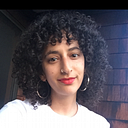lol Max, I don’t need us to have identical experiences. You make many mistakes when you assume anything at all, especially the idea that I think I know “everything” about Judaism. On the contrary, my knowledge is what I would consider a very tip of the iceberg (I wrote an article about envying Jews who grew up conservative and orthodox for this reason). But what I know and feel about my Judaism, I hold dear. And it’s not the only thing that matters in my life, but it matters deeply.
I think you are projecting an inability to hold multiple truths and assumptions about many, many things. Race is a construct, therefore anything written about it will venture into theory and subjectivity, and that will generate a multitude of opinions. That’s fine; I haven’t seen my thesis captured much elsewhere, so I have volunteered a case for it with reason and logic and experience and feelings. It will not resonate for everyone, and that is fine.
My upbringing, though reform, was very, very influenced by the experience of Jews fleeing Eastern Europe and coming to a new country with nothing, and in many ways trying to assimilate and conform so they could remove themselves from danger. There is literally an entire field of neuroscience called epigenetics that indicates how traumatic experiences literally change your DNA; you carry the trauma of your parents and their parents etc. and it changes who you are.
Many of us have been told for a long time to “get over victim mentality” and other aphorisms of toxic positivity in the name of some obscure claim that it will make the world better, make us better (or immortal lmao), and it will make true oneness and unity possible. That’s garbage. All you really needed to say was those first two lines—our experiences are not the same, and that is okay. We can make peace with that, and it’s even okay for what I’ve written to challenge you. It’s even okay to try to rationally debate about it.
But attempting to erase or underplay someone else’s pain or difficult experiences because you either haven’t had them or don’t perceive them to affect you will do nothing to achieve any kind of better world. If assimilation and a happy-go-lucky “nothing bothers me” is an aspirational mindset to you (and I don’t know if it is), then good for you. But I have examined this behavior for a long time, and don’t find it to do much other than bolster repression.
In the eastern medicine practice of Ayurveda, there is a Sanskrit word called “khavaigunya” which is almost like a wedge somewhere in your body, where unattended or unreconciled pain turns into dis-ease; this could literally be a scar that becomes a festering wound, a small growth that becomes cancerous, or, because many eastern practices don’t separate the body from the mind or soul, it can also be unacknowledged and undealt with emotions and pain turning into delusions or chronic depression and mental illness.
There are reasons so many patterns of familial trauma are recycled, and people wake up at some point in life realizing they have become the most insufferable parts of their parents. The experiences of those who raised us, whose genes and blood literally are coursing through our veins, are foundational and inextricable parts of who we are.
There are many who don’t like to view anything in life as beyond our control (because it’s scary). But there is so, so much we can’t control— and that is okay. What family you were born into, getting bullied for how you looked, how you grew up, who you are attracted to, if you got hit by a car and disabled, what the weather was on your wedding day, etc.
To me, being born Jewish, having the experiences of my ancestors coursing through my veins (and the distinctly Jewish memories of the distinctly Jewish experiences of my parents and grandparents) is not something that I wish to subdue or “overcome.” It’s who I am. Which is why even having to write this article is so bizarre; of course my experience is different than someone who is not ethnically Jewish (and indeed, even within Jewish communities, my experience certainly isn’t the same as a Beta Israel Jew, for example). But there are those who would say that being Jewish and being proud of my ancestry, and having a desire to reconcile the pain of my ancestors in an intentional way “sews division” or something along those lines.
To me, I feel bad for many of those people because the resentment of me speaking to my objective reality and calling out differences is triggering because they have for so long resisted any association with who they are and where they come from, so it’s perceived as a threat when anyone else draws attention to that and suggests it is foundational. Well, as even split up twins will tell you, biology is a formative part of our experience and our identities and habits— and so is upbringing/context. That’s why both nature and nurture affect who we are and who we become.
But I am not ashamed. And I think you should reflect on how you started this conversation with me to begin with, before assuming that I set out to be snide or insulting to you. And once you re-read what you wrote, perhaps you can do some introspection as to why you had that gut reaction. Because I don’t think it’s about me; I think it’s about you.
Happy Hanukkah 🕎
4 min readDec 10, 2023
Written by Mallory Mosner
Queer non-binary (they/she) Jewish writer and Ayurvedic Health Counselor who loves puzzles, cats and meditation.
